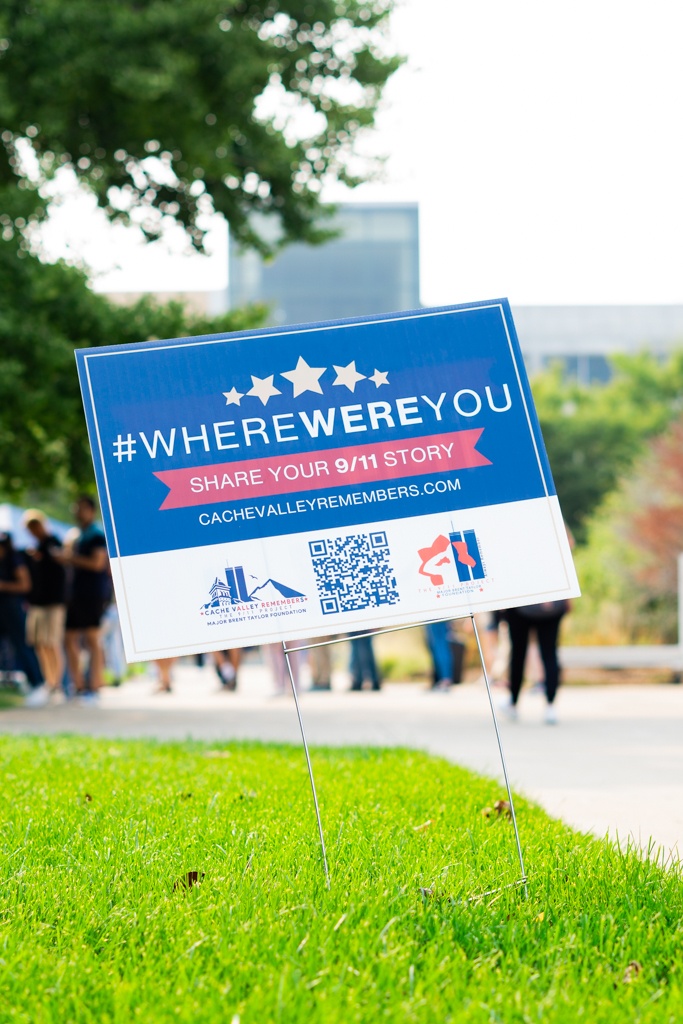Cache Valley Remembers project commemorates 9/11
On Sept. 11, 2001, the United States of America fell victim to one of the deadliest terrorist attacks ever recorded in human history. Thousands of lives were lost, and even more lives were affected by the ongoing impacts of the tragedy.
According to a 2011 Pew Research study, roughly 75% of Americans said 9/11 continued to have a profound impact on their lives, even 10 years after the attack.
Amidst the devastation the country experienced, hope and perseverance have risen from the ashes. Local communities have found ways to comprehend the tragedy, commemorate the lives lost and inform future generations of the importance this period has had on American history.
Jennie Taylor, executive director of the Major Brent Taylor Foundation, started the Cache Valley Remembers: The 9/11 Project in 2021, on the 20th anniversary of the attack.
“The Major Brent Taylor Foundation is named after my husband, who was a soldier killed in Afghanistan almost six years ago,” Taylor said. “Our foundation was born out of the tragedy of my husband’s death, and this project was born out of the tragedy of 9/11.”
Taylor and her family created the foundation as a way to turn their grief and loss into something positive, and they strive to do the same with The 9/11 Project.
The project’s event will be held from Sept. 11 to Sept. 14 at the Hanson Family Sports Complex. It will include a multi-sensory exhibition recounting the history of 9/11.
“We’re going to be turning the Hanson Family Sports Complex into a museum, an exhibit, a giant come to life field trip,” Taylor said. “You’re going to be able to walk through photo, audio and video experiences that really take you back to what happened.”
The exhibit will include roughly 400 feet by eight feet murals, 20 televisions and a variety of audio clips that will show news coverage of the Twin Towers falling, phone calls to loved ones from passengers on Flight 93 and firsthand witness experiences of the attack.
“It’s very immersive and very emotional, but we want it to be forward thinking,” Taylor said.
The last day of the exhibition will include a 5K run/walk, where attendees can complete a 5K in honor of the firefighters and servicemen who lost their lives protecting others on 9/11.
“Our goal is to remind people not only of the tragic loss, but of the heroic response to that tragedy,” Taylor said.
Participants in the race will receive a photo bag and biography of one of the many firefighters who lost their lives in the attack.
“It’s a chance to really immerse yourself in history in a way that hopefully motivates your present day and your future activity,” Taylor said.
According to Taylor, a cornerstone of the event is encouraging participants to take what they have learned from this tragedy and turn it into positive acts of service.
“When we serve our community together, we can set aside some of our differences and focus on that unity,” Taylor said. “I want people who don’t look like each other, don’t think like each other, don’t worship like each other to come together.”
Some positive acts of service could include donating blood, volunteering at homeless shelters and soup kitchens or volunteering to be a part of the event itself.
“One of the greatest parts of the project is that it takes about five to six hundred volunteers to pull it off from start to finish,” Taylor said. “We have so much to learn from each other, instead of so much to criticize each other, and I know no better way to do that than to just roll up our sleeves and get to work together.”
Learning from and commemorating 9/11 doesn’t only occur on a community level, but on an individual level.
Gracie Staley, a USU student, views commemoration and remembrance of major historical tragedies like 9/11 as an opportunity to learn from the past.
“Even though I wasn’t alive during 9/11, and it didn’t really affect my personal life, I’ve seen how it has deeply affected others,” Staley said.
Staley said she remembers sitting in her elementary school classroom at age 10, not fully comprehending how 9/11 seemed to still have an influence on the current world she was living in.
“It affected future politics, military action, public opinions on terrorism — it even affected how certain minorities were viewed in the United States,” Staley said. “Not to mention the families who lost parents, siblings, grandparents and friends.”
Staley hopes commemorating 9/11 not only keeps the memory of what was lost alive, but also serves as a reminder to the nation of how responses to tragedy should strive to build communities up, not tear them apart.
“It’s something I’ve heard in probably every history class I’ve ever taken,” Staley said. “If we can’t learn from our history, then we might end up repeating it.”

